Beyond Free Speech and Propaganda
Politics, Literature, and Film
Series Editor: Lee Trepanier, Saginaw Valley State University
The Politics, Literature, and Film series is an interdisciplinary examination of the intersection of politics with literature and/or film. The series is receptive to works that use a variety of methodological approaches, focus on any period from antiquity to the present, and situate their analysis in national, comparative, or global contexts. Politics, Literature, and Film seeks to be truly interdisciplinary by including authors from all the fields of the social sciences and humanities, such as political science, sociology, psychology, literature, philosophy, history, religious studies, and law. The series is open to both American and non-American literature and film. By putting forth bold and innovative ideas that appeal to a broad range of interests, the series aims to enrich our conversations about literature, film, and their relationship to politics.
Advisory Board
Richard Avaramenko, University of Wisconsin-Madison
Linda Beail, Point Loma Nazarene University
Claudia Franziska Brhwiler, University of St. Gallen
Timothy Burns, Baylor University
Paul A. Cantor, University of Virginia
Joshua Foa Dienstag, University of California at Los Angeles
Lilly Goren, Carroll University
Natalie Taylor, Skidmore College
Ann Ward, University of Regina
Catherine Heldt Zuckert, University of Notre Dame
Recent Titles
Milton's Socratic Rationalism: The Conversations of Adam and Eve in Paradise Lost by David Oliver Davies
Walker Percy and the Politics of the Wayfarer by Brian A. Smith
Romanticism and Civilization: Love, Marriage and Family in Rousseaus Julie by Mark Kremer
Aldous Huxley: The Political Thought of a Man of Letters by Alessandro Maurini
Sinclair Lewis and American Democracy by Steven Michels
Liberty, Individuality, and Democracy in Jorge Luis Borges by Alejandra M. Salinas
Philip Roth and American Liberalism: Historical Content and Literary Form in the Later Works by Andy Connolly
Seeing through the Screen: Interpreting American Political Film by Bruce E. Altschuler
Cowboy Politics: Myths and Discourses in Popular Westerns from The Virginian to Unforgiven and Deadwood, by John S. Nelson
Beyond Free Speech and Propaganda: The Political Development of Hollywood, 19071927 , by Jay Douglas Steinmetz
Beyond Free Speech and Propaganda
The Political Development of Hollywood, 19071927
Jay Douglas Steinmetz
LEXINGTON BOOKS
Lanham Boulder New York London
Published by Lexington Books
An imprint of The Rowman & Littlefield Publishing Group, Inc.
4501 Forbes Boulevard, Suite 200, Lanham, Maryland 20706
www.rowman.com
Unit A, Whitacre Mews, 26-34 Stannary Street, London SE11 4AB
Copyright 2018 by Lexington Books
All rights reserved . No part of this book may be reproduced in any form or by any electronic or mechanical means, including information storage and retrieval systems, without written permission from the publisher, except by a reviewer who may quote passages in a review.
British Library Cataloguing in Publication Information Available
Library of Congress Cataloging-in-Publication Data Available
ISBN 978-1-4985-5680-4 (cloth : alk. paper)
ISBN 978-1-4985-5681-1 (electronic)
 The paper used in this publication meets the minimum requirements of American National Standard for Information SciencesPermanence of Paper for Printed Library Materials, ANSI/NISO Z39.48-1992.
The paper used in this publication meets the minimum requirements of American National Standard for Information SciencesPermanence of Paper for Printed Library Materials, ANSI/NISO Z39.48-1992.
Printed in the United States of America
For Loredana, of course.
Contents
This book was a labor of love and I was not alone in that labor. I thank my dissertation committee members at the University of Oregon, Dr. Gerald Berk, Dr. Joseph Lowndes, Dr. Dan Tichenor, and Dr. Michael Aronson for their guidance and patience. Special thanks to everyone at the UOs Knight Library and the Knight Library Special Collections, who assisted me in those many hours, days, and weeks of archival research. Warmest appreciation to those working at the City of Portland Archives and Records, the New York Public Library, the Indiana State Library, and the Oscar Micheaux Museum in Gregory, South Dakota. Distinctive thanks to the editors at Lexington Books for their fine help and oversight. Lastly, an enormous thank you is reserved for all friends and family members who have cared for me during the long process of realizing this book.
Motion pictures do more than just reflect our political life. If we take seriously the cultural construction of human identityhow social life forges the performative features of gender and sex, race and ethnicitythen American movies of the twentieth century were more than a mirror onto a culture. They were dreams that made that culture. They were mass-produced dreams for the most part, commercial products of a factory-based system in Hollywood. As much a reflection of the political, the cinema has always been productive of political identity, a medium of images that travel along our relations of power. These images are the products of an industry that shaped ideologies and institutions central to American political development. The specific ideologies produced are less central to the following study than the frames of ideological productionthe politics of free speech for motion pictures, on the one hand, and the democracy of movie propaganda, on the other. But if the movies were economic products of social performance they were also, for much of the classic Hollywood era, a field of delimited political power. The story of the early American movie industry is the story of the triumph of commercialism over the social power of the cinema. What are the politics that lay behind the depoliticization of American movies?
Film free speech and movie propaganda were two ideological frames of American cinema in the 1910s. Both were to be cast aside in the creation of the classic Hollywood system. Film free speech was legally defeated by the Supreme Court case Mutual Film Corporation v. Industrial Commission of Ohio (1915) and somewhat ironically limited by Hollywoods first blockbuster and early symbol of film free speech, The Birth of a Nation (1915). The defeat of an explicitly propagandistic cinema came later, in the spasmodic paranoia of wartime America from 19171918, in which propaganda itself was put on trial. Both film free speech and movie propaganda were severely limited by a commercial industry forced to navigate the demands of moral regulation. But in a sense, both these limitations proved incomplete, hollow to the realities of an artistic medium with unique and pervasive social power. Commercialism may have triumphed in Americas most powerful entertainment industry, but it could never fully eliminate the social power of movies.
As America entered the 1920s, one part of the American film industrybig producers in Southern Californiaset about mastering an industry denatured of political meaning, casting aside the free speech argument for film, and eliminating the propagandistic power of the screen. The process of denaturing the political from the American movie industry coincided with other processes: the decline of exhibitor power and the rise of producer power in the industry; the decline of Progressive-Era moralism; and the destruction of legal liquor. These three developments reinforced the depoliticization of American movies, creating opportunities for the future moguls of the industry to define the economic arrangements of entertainment and to shape the foundations of consumer capitalism. There were a series of strategies, alignments, and conflicts that shaped what we know today as the classic Hollywood system, all of which threaded through two main institutional threatseconomic regulation of the industry and censorship of the screen.

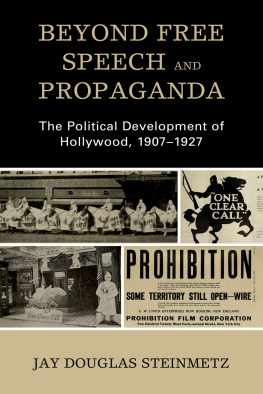

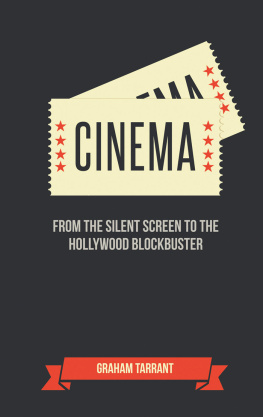
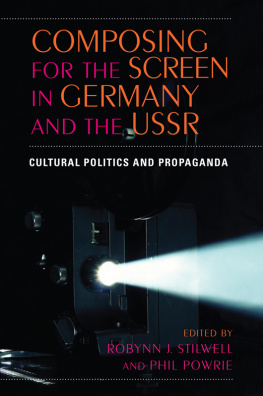
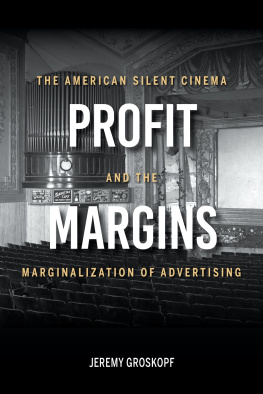
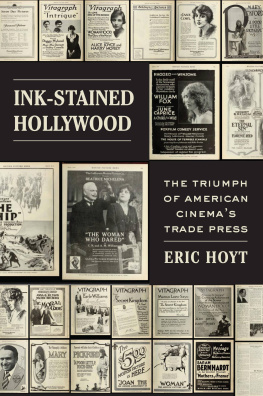
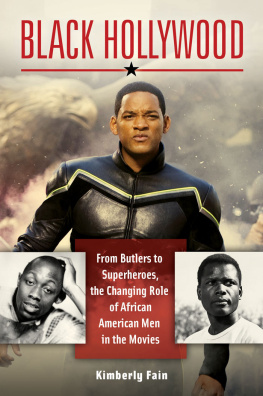

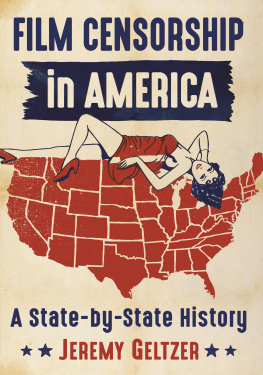

 The paper used in this publication meets the minimum requirements of American National Standard for Information SciencesPermanence of Paper for Printed Library Materials, ANSI/NISO Z39.48-1992.
The paper used in this publication meets the minimum requirements of American National Standard for Information SciencesPermanence of Paper for Printed Library Materials, ANSI/NISO Z39.48-1992.